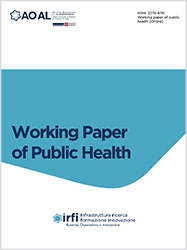A survey on prostate symptoms and quality of life in men with comorbidities at the Public Hospital SS. Antonio e Biagio e Cesare Arrigo of Alessandria
Accepted: 6 November 2023
All claims expressed in this article are solely those of the authors and do not necessarily represent those of their affiliated organizations, or those of the publisher, the editors and the reviewers. Any product that may be evaluated in this article or claim that may be made by its manufacturer is not guaranteed or endorsed by the publisher.
Background: Benign Prostatic Hyperplasia (BPH) is a pathological condition characterized by an increase in the size of the prostate gland which can lead to Lower Urinary Tract Symptoms (LUTS) that affect the quality of life. Methods: the International Prostatic Symptoms Score (IPSS) questionnaire was used to assess the symptoms of benign prostatic hyperplasia in male individuals with comorbidities, patients over 30 years of age who had not been diagnosed with urological or prostatic disease. Results: a total of 102 IPSS questionnaires were analyzed. According to age, 62.1% of patients reported mild symptoms, 34% had moderate symptoms, and 3.9% had severe symptoms, consistent with increasing age. Among patients who completed the questionnaire, a higher percentage (67%) had voiding dysfunction during the filling phase. Conclusions: in agreement with the literature, the IPSS questionnaire can be used as a screening model for the early detection and management of LUTS. As demonstrated by our results, symptoms worsen with age, therefore early detection may reduce the risk of complications and anticipate a visit to a specialist.
Aaron L, Franco OE, Hayward SW. Review of prostate anatomy and embryology and the etiology of benign prostatic hyperplasia. Urologic Clinics of North America. 2016;43:279-88. DOI: https://doi.org/10.1016/j.ucl.2016.04.012
Lim KB. Epidemiology of clinical benign prostatic hyperplasia. Asian Journal of Urology. 2017;4:148-51. DOI: https://doi.org/10.1016/j.ajur.2017.06.004
Sundaram D. Correlation of prostate gland size and uroflowmetry in patients with lower urinary tract symptoms. Journal of Clinical and Diagnostic Research. 2017;11:AC01-4. DOI: https://doi.org/10.7860/JCDR/2017/26651.9835
AIOM. Carcinoma della prostata. Available from: www.aiom.it/linee-guida-aiom-2021-carcinoma-della-prostata
Abdelmoteleb H, Jefferies ER, Drake MJ. Assessment and management of male lower urinary tract symptoms (Luts). International Journal of Surgery. 2016;25:164-71. DOI: https://doi.org/10.1016/j.ijsu.2015.11.043
Chughtai B, Forde JC, Thomas DDM, et al. Benign prostatic hyperplasia. Nature Reviews Disease Primers. 2016;2:16031. DOI: https://doi.org/10.1038/nrdp.2016.31
Hedlund P, Gratzke C. The endocannabinoid system—A target for the treatment of LUTS? Nature Reviews Urology. 2016;13:463-70. DOI: https://doi.org/10.1038/nrurol.2016.110
Chong C, Fong L, Lai R, et al. The prevalence of lower urinary tract symptoms and treatment-seeking behaviour in males over 40 years in Singapore: A community-based study. Prostate Cancer and Prostatic Diseases. 2012;15:273-7. DOI: https://doi.org/10.1038/pcan.2011.69
Wong SY, Woo J, Hong A, et al. Risk factors for lower urinary tract symptoms in southern Chinese men. Urology. 2006;68:1009-14. DOI: https://doi.org/10.1016/j.urology.2006.05.039
Kok ET, Schouten BW, Bohnen AM, et al. Risk factors for lower urinary tract symptoms suggestive of benign prostatic hyperplasia in a community based population of healthy aging men: The Krimpen study. Journal of Urology. 2009;181:710-6. DOI: https://doi.org/10.1016/j.juro.2008.10.025
Pinto JDO, He H, Chan SWC, et al. Health‐related quality of life and psychological well‐being in patients with benign prostatic hyperplasia. Journal of Clinical Nursing. 2015;24:511-22. DOI: https://doi.org/10.1111/jocn.12636
Gratzke C, Bachmann A, Descazeaud A, et al. Eau guidelines on the assessment of non-neurogenic male lower urinary tract symptoms including benign prostatic obstruction. European Urology. 2015;67:1099-109. DOI: https://doi.org/10.1016/j.eururo.2014.12.038
Barry MJ, Fowler FJ, O’Leary MP, et al. The american urological association symptom index for benign prostatic hyperplasia. Journal of Urology. 1992;148:1549-57. DOI: https://doi.org/10.1016/S0022-5347(17)36966-5
Weiss JP. Nocturia: Focus on etiology and consequences. Reviews in Urology. 2012;14:48-55.
Speakman M, Cheng X. Management of the complications of bph/boo. Indian Journal of Urology. 2014;30:208. DOI: https://doi.org/10.4103/0970-1591.127856
Thompson AE, Anisimowicz Y, Miedema B, et al. The influence of gender and other patient characteristics on health care-seeking behaviour: A QUALICOPC study. BMC Family Practice. 2016;17:38. DOI: https://doi.org/10.1186/s12875-016-0440-0
Stewart TS, Moodley J, Walter FM. Population risk factors for late-stage presentation of cervical cancer in sub-Saharan Africa. Cancer Epidemiology. 2018;53:81-92. DOI: https://doi.org/10.1016/j.canep.2018.01.014
Griffith JW, Messersmith EE, Gillespie BW, et al. Reasons for seeking clinical care for lower urinary tract symptoms: A mixed methods study. Journal of Urology. 2018;199:528-35. DOI: https://doi.org/10.1016/j.juro.2017.07.067
Rupert DJ, Gard Read J, Amoozegar JB, et al. Peer-generated health information: The role of online communities in patient and caregiver health decisions. Journal of Health Communication. 2016;21:1187-97. DOI: https://doi.org/10.1080/10810730.2016.1237592
Coyne KS, Sexton CC, Thompson CL, et al. The prevalence of lower urinary tract symptoms (Luts) in the USA, the UK and Sweden: Results from the Epidemiology of LUTS (Epiluts) study. BJU International. 2009;104:352-60. DOI: https://doi.org/10.1111/j.1464-410X.2009.08427.x
Copyright (c) 2024 Alessia Francese, Andrea Di Stasio, Armando Serao, Roberta Di Matteo, Mariasilvia Como, Mariateresa Dacquino, Tatiana Bolgeo, Antonio Maconi

This work is licensed under a Creative Commons Attribution-NonCommercial 4.0 International License.
PAGEPress has chosen to apply the Creative Commons Attribution NonCommercial 4.0 International License (CC BY-NC 4.0) to all manuscripts to be published.

 https://doi.org/10.4081/wpph.2024.9790
https://doi.org/10.4081/wpph.2024.9790




